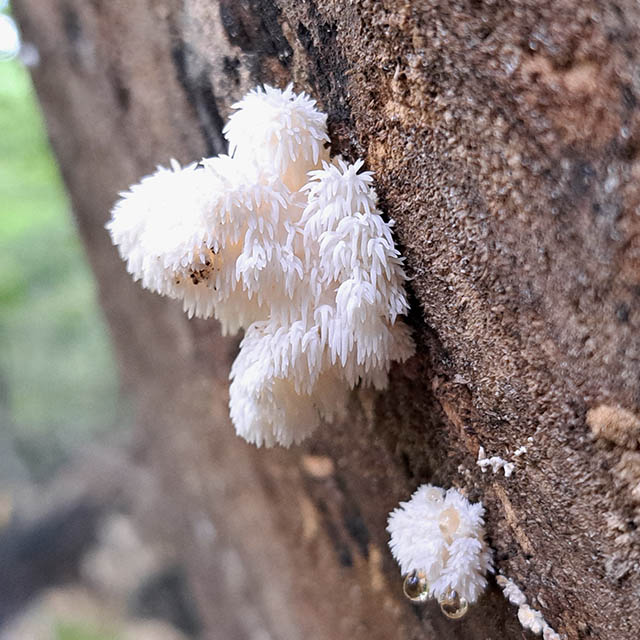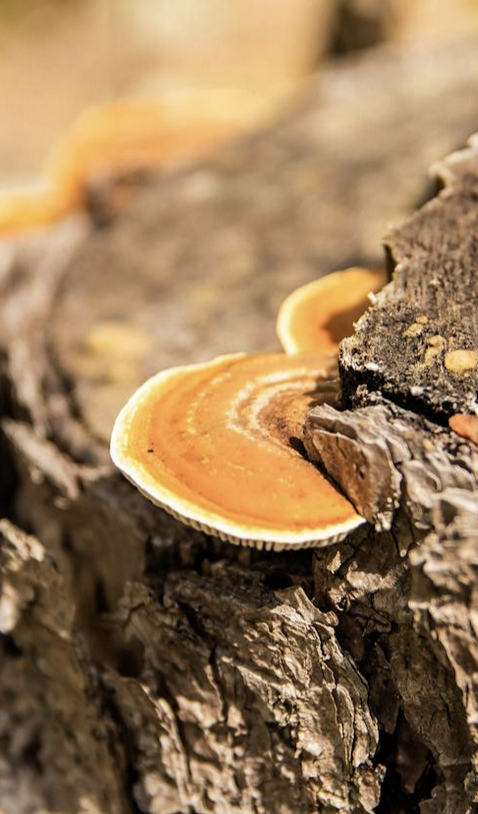Your cart is currently empty!

5 Natural Ways Mushrooms Can Improve Your Gut Health and Digestion
This article explores how mushrooms can naturally improve gut health, backed by scientific research. Mushrooms contain prebiotic fibers like beta-glucans and chitin, which feed beneficial gut bacteria such as Bifidobacterium and Lactobacillus, essential for a balanced microbiome. These bacteria produce short-chain fatty acids that nourish the colon lining and reduce inflammation, aiding digestion and metabolic…
The humble mushroom has been revered for centuries for its culinary and medicinal properties. In recent years, scientific research has shed light on the powerful ways that various mushroom species can support digestive health and enhance the gut microbiome. From boosting beneficial bacteria to reducing inflammation, mushrooms offer a natural approach to improving digestion and overall wellness, we discuss evidence-based ways of how mushrooms can naturally boost your gut health and digestion.
1. Prebiotic Fiber to Feed Beneficial Gut Bacteria
One of the most important ways that mushrooms support digestive health is through their prebiotic fiber content. Prebiotics are non-digestible fibers that feed the beneficial bacteria in our gut, allowing them to thrive and multiply. A healthy, diverse gut microbiome is essential for proper digestion, nutrient absorption, immune function, and even mental health.
Mushrooms are rich in beta-glucans and chitin, two types of prebiotic fibers that act as fuel for probiotic bacteria like Bifidobacterium and Lactobacillus species. These beneficial microbes ferment the prebiotic fibers, producing short-chain fatty acids (SCFAs) like butyrate that nourish the cells lining the colon and reduce inflammation.
A 2021 study published in the Journal of Nutritional Biochemistry found that mice fed white button mushrooms experienced significant increases in beneficial Prevotella bacteria and improvements in glucose regulation. The researchers concluded that the prebiotic effects of mushrooms may help prevent metabolic disorders.
Turkey tail mushroom (Trametes versicolor) is particularly renowned for its prebiotic properties. A 2014 study in the British Journal of Nutrition showed that turkey tail extract increased populations of Bifidobacterium and Lactobacillus probiotics while decreasing potentially harmful bacteria like E. coli and Clostridium species.
For those looking for convenient ways to incorporate turkey tail into their diet, turkey tail gummies have become a popular option. These chewable supplements provide a measured dose of turkey tail extract in a palatable form. When choosing turkey tail gummies or other mushroom supplements for gut health, look for products that use high-quality extracts standardized for beta-glucan content.
2. Anti-Inflammatory Effects to Soothe the Digestive Tract
Chronic inflammation in the gut is associated with a range of digestive disorders, from inflammatory bowel disease (IBD) to leaky gut syndrome. Many mushroom species contain powerful anti-inflammatory compounds that may help reduce gut inflammation and support healing of the intestinal lining.
Reishi mushroom (Ganoderma lucidum) is one of the most well-studied mushrooms for its anti-inflammatory effects. A 2015 study in the journal Food & Function found that reishi extract significantly reduced inflammation and tissue damage in a mouse model of colitis. The researchers identified several triterpenes in reishi that suppressed pro-inflammatory signaling pathways.
Lion’s mane mushroom (Hericium erinaceus) has also shown promise for reducing gut inflammation. A 2019 study in the International Journal of Molecular Sciences demonstrated that lion’s mane extract decreased inflammatory markers and protected against alcohol-induced stomach ulcers in rats. The mushroom’s anti-inflammatory effects were attributed to its high polysaccharide content.
Cordyceps mushroom, while not as commonly associated with gut health, may also offer anti-inflammatory benefits for the digestive tract. A 2018 study in Biomedicine & Pharmacotherapy found that cordycepin, a bioactive compound in cordyceps, reduced inflammation and mucosal damage in a mouse model of colitis.
By incorporating a variety of anti-inflammatory mushrooms into your diet or supplement regimen, you may be able to soothe gut irritation and support a healthy digestive environment. Many mushroom supplements for gut health combine multiple species to provide a broad spectrum of beneficial compounds.
3. Immune-Modulating Effects to Balance Gut Immunity
The gut is home to a large portion of our immune system, and maintaining proper immune balance in the digestive tract is crucial for overall health. Many mushroom species have immune-modulating properties that can help regulate gut immunity and prevent excessive inflammation or autoimmune reactions.
Turkey tail mushroom is once again a standout in this category. Its polysaccharide-K (PSK) and polysaccharide-P (PSP) compounds have been shown to enhance the activity of natural killer cells and T-cells, important components of the immune system. A 2011 study in the journal BMC Immunology found that turkey tail extract increased the production of beneficial cytokines while decreasing pro-inflammatory molecules in human immune cells.
Shiitake mushroom (Lentinus edodes) is another powerful immune modulator. A 2015 study in the Journal of the American College of Nutrition showed that consuming shiitake mushrooms daily for 4 weeks improved immune markers in healthy adults. The researchers observed increased production of secretory IgA, an antibody that plays a crucial role in gut immunity.
Maitake mushroom (Grifola frondosa) has also demonstrated immune-enhancing effects that may benefit gut health. A 2013 study in the Annals of Translational Medicine found that maitake extract activated various immune cells and increased the production of interferon-gamma, a key immune-regulating molecule.
By supporting balanced immune function in the gut, these mushrooms may help prevent excessive inflammation while still allowing the immune system to effectively combat harmful pathogens. This immune-modulating effect is one reason why mushroom supplements for gut health have gained popularity among those with autoimmune conditions affecting the digestive tract.
4. Antioxidant Properties to Protect the Gut Lining
Oxidative stress and free radical damage can contribute to inflammation and tissue injury in the digestive system. Many mushroom species are rich in antioxidant compounds that can help neutralize free radicals and protect the delicate cells lining the gut.
Chaga mushroom (Inonotus obliquus) is renowned for its exceptionally high antioxidant content. A 2019 study found that chaga extract had potent free radical scavenging activity and protected against oxidative DNA damage. The researchers suggested that chaga’s antioxidant properties could help prevent oxidative stress-related gastrointestinal disorders.
Oyster mushrooms (Pleurotus species) are another excellent source of antioxidants. A 2017 study in the Saudi Journal of Biological Sciences showed that oyster mushroom extract had strong antioxidant activity and protected against ethanol-induced gastric ulcers in rats. The mushroom’s ergothioneine content was identified as a key factor in its protective effects.
Reishi mushroom also boasts impressive antioxidant properties. A 2013 study in the International Journal of Medicinal Mushrooms found that reishi polysaccharides significantly increased antioxidant enzyme activity and reduced oxidative stress markers in the liver and kidneys of diabetic rats.
By incorporating antioxidant-rich mushrooms into your diet or taking mushroom supplements for gut health, you may be able to reduce oxidative damage in the digestive tract and support the integrity of the gut lining. This can be particularly beneficial for those with conditions like leaky gut syndrome or IBD, where maintaining a healthy intestinal barrier is crucial.
5. Digestive Enzyme Production to Enhance Nutrient Absorption
Some mushroom species have been shown to stimulate the production of digestive enzymes, which can enhance the breakdown and absorption of nutrients from food. This can be especially beneficial for those with compromised digestive function or nutrient absorption issues.
Lion’s mane mushroom has demonstrated the ability to increase the activity of digestive enzymes. A 2017 study in the International Journal of Medicinal Mushrooms found that lion’s mane extract significantly increased the activity of amylase and lipase, enzymes that break down carbohydrates and fats, respectively. The researchers suggested that lion’s mane could potentially be used as a natural digestive aid.
Shiitake mushroom has also been shown to support digestive enzyme production. A 2015 study in the Journal of Agricultural and Food Chemistry found that shiitake extract increased the activity of pepsin, a key enzyme involved in protein digestion. The mushroom’s lentinan polysaccharide was identified as the primary compound responsible for this effect.
Turkey tail mushroom, while primarily known for its prebiotic and immune-modulating properties, may also support digestive enzyme activity. A 2020 study in the journal Nutrients found that turkey tail extract increased the activity of pancreatic lipase in vitro, suggesting potential benefits for fat digestion.
By supporting the production and activity of digestive enzymes, these mushrooms may help improve overall nutrient absorption and reduce symptoms of indigestion. Many people who take mushroom supplements for gut health report improvements in digestion and reduced bloating or discomfort after meals.
Concluding the Gut to Brain Health Axis
The scientific evidence supporting the use of mushrooms for gut health and digestion is rapidly expanding. From prebiotic effects and anti-inflammatory properties to immune modulation and antioxidant protection, mushrooms offer a multi-faceted approach to supporting digestive wellness.
While whole mushrooms can certainly be incorporated into a healthy diet, mushroom supplements for gut health have gained popularity due to their convenience and concentrated beneficial compounds. Turkey tail gummies, in particular, have emerged as a tasty and easy way to harness the gut health benefits of this powerful medicinal mushroom.
As with any dietary change or supplement regimen, it’s important to consult with a healthcare professional before adding mushrooms or mushroom supplements to your routine, especially if you have existing health conditions or are taking medications. Additionally, choose high-quality products from reputable sources to ensure you’re getting the full spectrum of beneficial compounds.
By harnessing the natural power of mushrooms, you may be able to improve your gut health, enhance digestion, and support overall wellness. As research in this area continues to evolve, we can expect to uncover even more ways that these fascinating fungi can benefit our digestive systems and beyond.



Leave a Reply